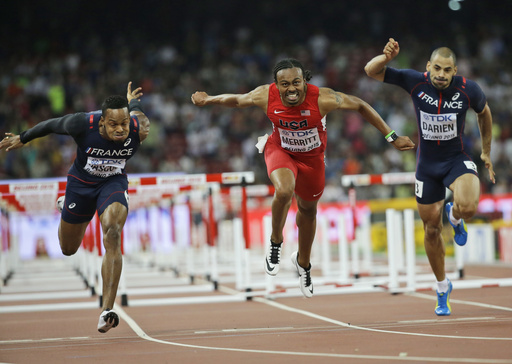EUGENE, Ore. (AP) — Some reach out to him as Aries Merritt, the 110-meter hurdles world-record holder. Top hurdlers seek his input all the time.
Others reach out to him as Aries Merritt, the kidney transplant recipient. They ask about his journey in 2015, when days after winning a bronze medal at the Beijing world championships he flew home to receive a kidney from his sister.
These days, helping anyone clear hurdles on the track or in life are important tasks for the 38-year-old Merritt. He’s analyzed the technique of numerous hurdlers at the Olympic trials this week in Eugene, Oregon, who’ve contacted him. That’s on top of his coaching responsibilities at Brown University. And in addition to being a sounding board for transplant recipients.
“I love being some sort of inspiration and motivation for others to succeed,” Merritt said in an interview with The Associated Press. “I mean, I’m in a good spot. I’m very healthy. My kidney is fine. I have a good job. Family’s doing great. Everything’s as good as it could be.”
Just don’t mention “retirement.” It’s a term he’s not quite ready to use even if he hasn’t competed in three years and has been an assistant coach at Brown for the past two seasons.
Because to voice it officially closes the book on a stellar career, one that includes a 2012 Olympic gold medal and setting a world record (12.80 seconds) that’s still standing nearly a dozen years later.
“Being an athlete,” he said, “is my identity.”
Being a role model, though, becomes his driving force.
Especially for those in need of an organ transplant, because he knows what they’re going through.
Right before worlds in 2015, Merritt revealed he was suffering from a rare genetic disorder in which his kidneys steadily had been shutting down. It was to the point that if he didn’t receive a transplant soon, his kidney function would soon reach zero percent.
His sister, LaToya, was a match.
Just a few days after his third-place finish in Beijing, he was on the operating table and receiving his new kidney.
Merritt returned in time for the 2016 Olympic trials but finished one spot away from landing on the U.S. team for the Rio de Janeiro Games. A year later, he was fifth at worlds.
Then, injuries hit. Hamstring pulls. Torn calf muscles.
Now, some medical complications. His kidney and his appendix started to basically fuse together.
Last month, with his appendix close to rupturing, doctors performed a delicate procedure. Since then, he’s been recovering. He will be watching trials from home and taking notes as athletes try to earn a ticket to the Paris Games later this summer.
That way, he can pass along even more insight to his young cast of sprinters and hurdlers at Brown. It’s all part of his grand plan to be the next big-time track coach.
“We have such legendary coaches here in America, and I’m trying to keep that legacy alive,” Merritt said. “I know that I’m going to be coaching forever.”
When Merritt’s athletes at Brown struggle to understand a technique, he jumps in to demonstrate. And even though he hasn’t competed since 2021, his speed and form remain on point.
“They’re like, ‘How are you moving that fast?’” said Merritt, a 2006 NCAA champion while at Tennessee. “It’s just ingrained in me.”
His dedication to detail — and having the world record — is why big names in the event reach out to him for advice. He’s analyzed the performances of three-time defending world champion and Tokyo Games silver medalist Grant Holloway. Same with Trey Cunningham, a silver medalist at worlds in 2022, and Daniel Roberts, the bronze medalist at worlds last summer.
“I’m an open book,” Merritt said. “Because I’m really excited to see how far they can take the event. At some point, somebody’s got to get that (world) record.”
On Sept. 7, 2012, in a race in Belgium, Merritt went 12.80 seconds to break the mark held by Dayron Robles of Cuba by .07 seconds. Only Holloway — 12.81 at the 2021 Olympic trials — has come close to Merritt’s mark.
“It’s a hard record to get,” said Merritt, who lives in Providence, Rhode Island. “A lot of people still study that race. It’s a blueprint and a model. It was just the culmination of a lot of hard work, a lot of training and the conditions coming together.”
He thinks he could have gone lower, too, if not for his kidney issue.
“I just didn’t have the opportunity to do so after having a major life-altering surgery,” said Merritt, whose top time in a meet after the transplant was 13.09 in 2017. “I was just trying to come back and inspire all of these kids. Show them that if anything is going on with your body or if you had a transplant, you can still come back and do things you love doing.”
He’s currently writing an as-yet-untitled book to chronicle his journey.
“The doctors were like: ‘You might reject (the transplant). You might not make it out of the surgery,’” Merritt said. “But I came back to the sport. I ran really fast. I achieved a lot.”
___
AP Summer Olympics: https://apnews.com/hub/2024-paris-olympic-games
